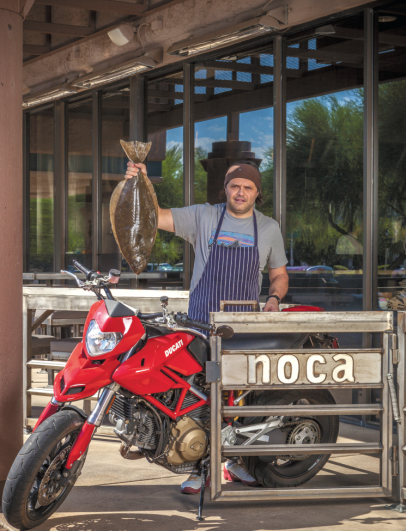Claudio Urciuoli, A Chef Driven by Ingredients
On the surface, Chef Claudio Urciuoli is hard to figure out. His stoic features communicate that he'd rather peel a thousand tomatoes than crack a smile. Catch his glance and you might incur a scowl. Watch him work and witness a laser-focused chef. Put a spotlight on him and he clams up.
But sit down to break bread, and the 42-year-old Slow Food advocate opens up with engrossing stories of growing up modestly in Italy with strong men – and even stronger women – as role models. He makes a convincing case for eating simple food from the land, and confesses to an insatiable love of traveling, preferably by motorcycle.
Urciuoli landed in Phoenix eight years ago with impressive credentials. Since then, he has worked at both resort and independent restaurants, including Prado at the Intercontinental Montelucia Resort, and a productive 16-month stint with Chris Bianco's restaurant group. In late April, he and Bianco amicably parted ways, and by late May Urciuoli was leading the kitchen at Eliot Wexler's ingredient-driven Restaurant noca.
Throughout his tenures (save noca, because it's too soon to tell), reviews from critics have been mixed, although the harshest criticism wasn't necessarily directed at the chef's food. In fact, critics soundly praised Urciuoli for his uncompromising focus on ingredients. Burrata may seem ubiquitous now, but many credit Urciuoli with bringing the supple cheese to the attention of Phoenicians in 2007.
Humble Beginnings
Urciuoli's point of view on ingredients – he says integrity is paramount – doesn't come from the latest farm-to-table trend, although he is an ardent supporter of small farmers. It stems from a lifelong interaction with humble ingredients cooked in the simplest manner possible, out of necessity rather than fashion.
"As a kid, I was affected by my family's strong connection to food," he says. "For me it's always been about respect for the product. In my culture, there is not excessive manipulation."
Born in the Campania region, about 25 miles north of Salerno, Urciuoli was surrounded by grandparents and a large extended family of aunts, uncles and cousins. Urciuoli's grandparents lived through harrowing times during World War II. The Nazis captured his grandfather, who eventually escaped but not without insurmountable stress and hardship for the family.
"It was tough, you know, but the strength of the house was always the woman," he says, remembering the resilient role his grandmother – and mother – played during his own childhood.
His grandparents were not people of wealth, and the austerity of wartime stretched what little they had even further. His maternal grandmother owned a salumeria. She worked all day and still cooked for the family. His grandfather hunted and made wine. They had hazelnut trees and a prolific garden. His grandmother's kitchen, anchored by a wood-burning fireplace, was the center of activity and in the winter, it was the main source of heat.
Each winter, a hog was slaughtered and preserved nose-totail. Urciuoli remembers nothing was wasted. His grandmother made sanguinaccio dolce, a dessert he isn't particularly fond of, from the warm blood of the pig and chocolate.
"Everything counted," he says, "and nothing was taken for granted."
Finding His Craft
Urciuoli's father was a flour salesman and his mother was an art teacher. When Urciuoli was 3, the family moved to the Piedmont region for several years, and later to Liguria when he was 9. Urciuoli wasn't predestined to become a chef, but he recognized at an early age the difference between the olive oil and vegetable–driven cuisine of his southern hometown and the heavy butter, cream and beef–influenced Piedmont area.
He recalls an incident involving a bowl of rich Bolognese over polenta he was served in kindergarten. The flavor and texture was completely different than the ragù and macaroni his mother and grandmother made. He refused to eat it. His teacher insisted he couldn't leave the table until he finished the bowl. A small battle ensued, and he dumped the food on the table. The teacher scraped the Bolognese back into the bowl and ordered him to eat it. After refusing again (and another table dumping) the exasperated teacher banished him to the nap room until the end of the school day.
When Urciuoli's mother arrived to pick him up, she was furious – not at Urciuoli, at the teacher. She emphatically told the teacher her son did not have to eat something he did not like. He says he wasn't a picky eater and his mother encouraged him to try everything, but she never forced him to eat something he didn't enjoy. Food was more than sustenance, she believed. Food was about pleasure, too. She packed his lunch from that day forward.
Urciuoli's parents encouraged their son to find a part-time job in his teens. His father set up an interview with a successful master baker, but when he learned that the baker would only take Urciuoli if the boy dedicated his life to his bakery, his father had second thoughts. Urciuoli was only 13, and even though the apprentice-to-master career path was not uncommon, Urciuoli's parents weren't convinced their young son should go that direction.
It was clear soon enough, though, that Urciuoli didn't care for academics, and so finding a trade seemed to be the best path. In the meantime, he took a part-time job as a cook and deck assistant on a luxury yacht. He helped cook and detail the boat, and when the owners were ready to sail for a week or two, he sailed along, running errands and gathering food wherever they docked.
From Italy to America
With modest cooking skills, Urciuoli enrolled in culinary school in Liguria, and spent the next several years staging in Michelinstarred resorts in southern France and Switzerland before the allure of America beckoned. He first visited New York when he was 19. At 23, he was ready to permanently move to the United States.
He had dreams of traveling the California coastal highway on a motorcycle, which eventually he did. After a brief stay on the East Coast, he found his way to California, easily landing a mid-level chef position at a Four Seasons resort.
Looking for a greater challenge, he signed on with the renowned Il Fornaio restaurant group, where he stayed nine years. He ran their most profitable restaurant, and headed up the team of opening chefs for other Il Fornaio expansions.
In 1999, he moved to Las Vegas briefly to help open the groundbreaking Las Vegas Bellagio, and then returned to Southern California, where he spent five years with iconic restaurateur Nancy Silverton, helping her grow La Brea Bakery from a small storefront to a nationally recognized brand. Urciuoli says Silverton asked him to help open Mozza, her award-winning pizzeria, but he was ready for something new.
Phoenix Bound
In 2004, a Kimpton property in Scottsdale called FireSky Resort was looking for a chef to develop its new restaurant, Taggia, and Urciuoli seemed to be the perfect fit. Taggia was slated to be a coastal Italian restaurant, and Urciuoli grew up on the Ligurian coast in the seafood-rich port town of Chiavari. However, when Urciuoli had to split his time between Taggia and another Kimpton property in Washington, DC, he decided it wasn't such a good fit after all.
After a brief run at Different Pointe of View, Urciuoli made the move to Prado, immersing himself in Spanish cuisine. He spent three months in Spain learning the food culture, discovering new ingredients and farmers.
When his good friend and fellow Slow Food enthusiast Chris Bianco called, Urciuoli left Prado to helped Bianco expand Pane Bianco to dinner hours and develop a new restaurant. Earlier this year, Urciuoli headed up the kitchen at Bianco's newest venture, Italian Restaurant. After three months it was clear that Urciuoli and Bianco weren't seeing eye to eye on the direction of Italian Restaurant, so the two parted ways but have remained on good terms.
With Urciuoli now in the open kitchen at noca, this chef/restaurateur pairing seems natural. Owner Wexler's obsession with pristine ingredients is well known. This summer, while Urciuoli returned to Italy to visit his parents, Wexler remodeled noca's kitchen, installing a deck oven for Urciuoli's breads and expanding the pasta station and equipment. They're stocking the pantry with ingredients Urciuoli has a special connection to, including a half dozen olive oils, each with a specific purpose; rare Italian beans, anchovies and other specialty items.
Connected to the Land
Throughout Urciuoli's career he has championed small farmers and producers from Italy and the United States. He still buys beans from a small producer he met while working at Il Fornaio. He talks of the difficulty small farmers face to get their product out of Italy and into the hands of appreciative chefs like him.
Every two years, he attends Terra Madre, a food conference in Italy sponsored by the international Slow Food organization, designed to elevate small farmers and producers who are preserving traditional food ways. He has plans to attend again this year. Sometimes, he is more enraptured by the people who struggle to grow traditional foods than he is of the food itself.
"These people," he says, "are connected to the land and the raw material. They are artisans, but they struggle. They will disappear if we don't support them."
So he does what he can: He buys their products, manipulates them as little as possible and presents them on a plate as food for the soul.
It turns out Urciuoli isn't so hard to figure out after all. For him, it's all about the ingredients and the people behind them.
Slow Food
Italian Carlo Petrini founded Slow Food in Italy in 1989, in response to the opening of a McDonald's on the Spanish Steps in Rome. Petrini saw the fast-food chain as a threat to the culture of Italian food. Today, the global, grassroots nonprofit has supporters in 150 countries with over 100,000 members, including Slow Food USA.
The Slow Food mission is to preserve local food traditions and celebrate the pleasure of good food through community, with respect for the environment. To find out more about Slow Food, globally, nationally or locally, visit these websites:
slowfood.com
slowfoodusa.org
slowfoodphoenix.org
Terra Madre & Salone del Gusto
Terra Madre, a food conference focusing on global communities working to preserve traditional food and farming knowledge, and Salone del Gusto, a public food exhibition extravaganza, are both produced by Slow Food and held every two years in Turin, Italy. Their purpose is to bring attention to small producers and growers who might not otherwise find markets for their products, and to serve as a knowledge exchange of ideas and products that promote good food, sustainability and fair trade. Terra Madre is traditionally open only to invited guests. This year for the first time Salone del Gusto and Terra Madre will be merged into one conference open to the general public.
Turin, Italy salonedelgustoterramadre.slowfood.com
Restaurant noca
Eliot Wexler opened his ingredient-driven, New American Restaurant noca in 2008, and has since gathered numerous awards, including Best New Restaurant, AAA Four Diamonds, and Wine Spectator's Award of Excellence. Claudio Urciuoli joined noca in May 2012.





